QuestionI'm a new puppy owner. We got a yellow female labrador retriever 2 weeks ago. She is now 9 weeks old. We got a labrador because they are known to be great dogs. We are crate training her. She has, however, made a few mistakes in the house. We are constantly taking her out, probably every hour to an hour and a half. After she makes her mistake, we repremand her and immediately take her outdoors. How long before she realizes that what she is doing inside is wrong. After I bring her in, I put her in the crate.
She has become very stubborn within the last 2 weeks - lots of biting - not nipping, harsh firm stubborn biting and also growls. She even bites when I'm trying to put her leash on or pick her up to bring her down the stairs to go outdoors. I was told to keep her on leash, even tethered to us, when she was out of the crate so she doesn't have free range of the house and in the crate when she wasn't monitored. I'm concerned and feel stressed. She bits us all, me, my husband and the kids. My husband and I yell at her with a firm "NO" , look at her in the eye and pull at her collar. She seems to get wild after I do that and continue to bite more. Sometimes I just yell and put her in the crate when she is misbaving. Sometimes I hold her in a snuggle position an d tell her to "relax". Am I being too rough at some a young age. She doesn't listen, even when I speak firmly. I even clap my hands or slam on the counter or table. I feel we are always yelling at her. The kids want to play with her, but she is always biting. We always give her chew toys. What are we doing wrong? This is the most crucial time and I want to take these bad habits away. Otherwise, We give her lots of love and attention. Please help.
AnswerSome labs can be difficult and need a firm hand. Different ones respond to different discipline. Give a warning stern "Bad Dog!". In stubborn cases, I repeat the "Bad dog!" right in its face with the dog on its back. Hold it down until it lifts one back leg to show submission. Another very
effective technique when the dog is small enough, is to pick it up with your
hands behind its front shoulders and hold it out with its back to you. Make
sure it is far enough out it can't fling its head into your face. Hold it
until it quits struggling and relaxes. Denying it your attention works great
too. Turn your back, walk off, whatever. Dogs are very social, and losing
your company is the worst thing that can happen. The solution to a stubborn
dog is an owner that is even more stubborn. Don't forget the praise and
petting when he finally yields.
Much of housebreaking is not training the puppy, but making it easier for your
puppy, you, and your carpet while its body to catches up to its instincts. At
around 8 weeks when the puppy goes to its new home, the time from when it
realizes it has to go, and when it can't wait any longer is a matter of
seconds. Only time will fix that. You can hardly be expected to be attentive
enough to avoid all accidents There is no sense punishing the puppy for your
inattention. It is not fair to punish you either, but you still have to clean
it up if you didn't have the puppy outside in time.
Housebreaking starts before you get home with the new puppy. If you don't have
a crate, buy one. I prefer the more enclosed, den like plastic ones. Skip the
bedding. At first it gets wet, and later it can be chewed into choking
hazards. A wire rack in the bottom will help keep the puppy up out of
accidents at first. They are available with the crates, but a piece of closely
spaced wire closet shelving from a home supply place is cheaper. If you
already have a metal crate, covering it may help. Just make sure you use
something the puppy can't pull in and chew. Dogs that start out in crates as
little puppies, accept them very well. Never leave an unattended puppy loose
in the house. If nobody can watch it, put it in the crate. I suggest letting
the dog have its crate all its life.
Choose a command and spot you want it to use. The less accessible to strays,
the less chance of serious disease. If it is a female, choosing a
non grassy spot will avoid brown spots later. When you bring it home, take it
to the spot and give it the command in a firm, but friendly voice. Keep
repeating the command and let the puppy sniff around. If it does anything,
praise it. Really let it know what a good dog it is and how much you love it,
and maybe a treat. Note, being out there not only means you can praise it,
but it also keeps it from being snatched by a hawk. If it doesn't go, take it
inside and give it a drink and any meals scheduled. A young puppy will need to
go out immediately afterward. Go to the spot and follow the above routine.
Praising it if it goes is extremely important. If it doesn't go, take it back
inside and put it in its crate and try again soon. Do not let it loose in the
house until it does go.
At first it is your responsibility to know and take the puppy out when it
needs to go. It needs to go out the first thing in the morning, after eating,
drinking, and sleeping. If it quits playing, and starts running around
sniffing, it is looking for a place to go. Take it out quickly. You will just
have to be what I call puppy broke until it is a little older.
By the time most dogs are about 3 months old, they have figured out that if
they go to the door and stand, you will let them out. The praise slowly shifts
to going to the door. Some people hang a bell there for the dog to paw. If
your dog doesn't figure this out, try praising it and putting it out if it
even gets near the door. A stern "Bad dog!" is all the punishment that is
effective, and only when you catch it in the act and are sure you didn't miss
it going to the door. Clean up accidents promptly. I mostly keep the little
puppies out of the carpeted rooms. Still I need the can of carpet foam
sometimes. First blot up all the urine you can with a dry towel. Keep moving
it and stepping on it until a fresh area stays dry. A couple big putty knives
work well on bowel movements. Just slide one under it while holding it with
the other. This gets it up with a minimum of pushing it down into the carpet.
This works with even relatively soft ones, vomit, dirt from over turned house
plants, or anything else from solids to thick liquids. Finish up with a good
shot of carpet foam. Note, do not let the puppy lick up the carpet foam.
Once the dog is reliably housebroken, your carpet may need a good steam cleaning.
Many people strongly strongly push cleaning up all evidence of past accidents. I am slower to suggest that. Dogs will return to the same spot if they can find it. When you see one sniffing the spot, that is your clue to run it out.

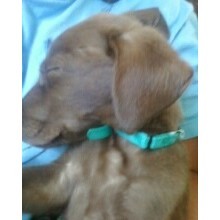 11 week old chocolate lab
Question
11 week old lab
We recently got a chocolate la
11 week old chocolate lab
Question
11 week old lab
We recently got a chocolate la
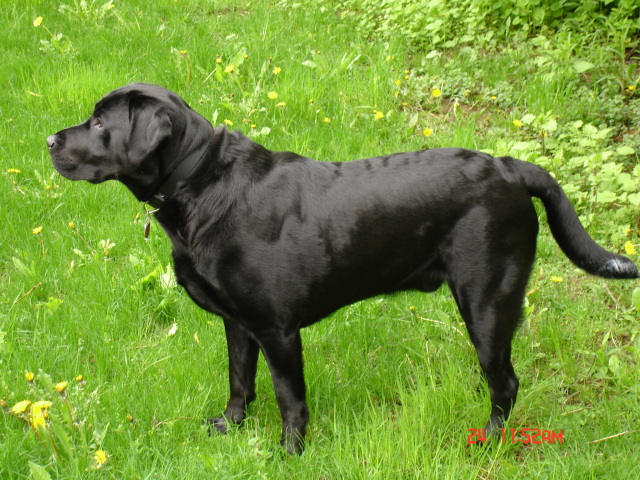 shedding, size, uncontrolled around other dogs
Question
Sawyer
My 13 month old black lab is shedding u
shedding, size, uncontrolled around other dogs
Question
Sawyer
My 13 month old black lab is shedding u
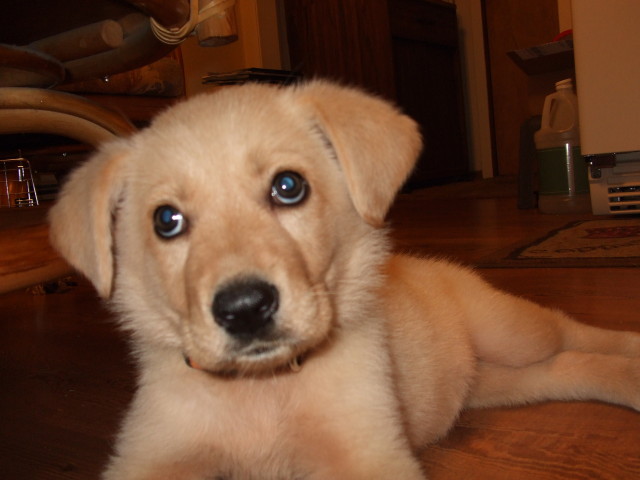 Young pup drinks too much
Question
Hi, Im Roxy & I have
I recently adopted a
Young pup drinks too much
Question
Hi, Im Roxy & I have
I recently adopted a
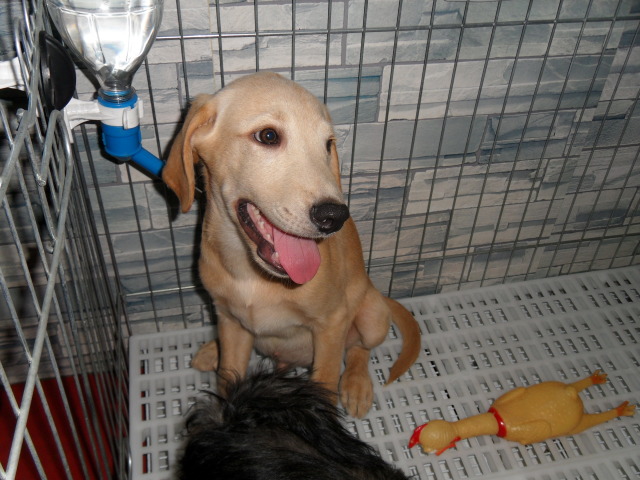 Is my dog a pure-bred lab?
Question
Sort of top view
Hi. I recently received
Is my dog a pure-bred lab?
Question
Sort of top view
Hi. I recently received
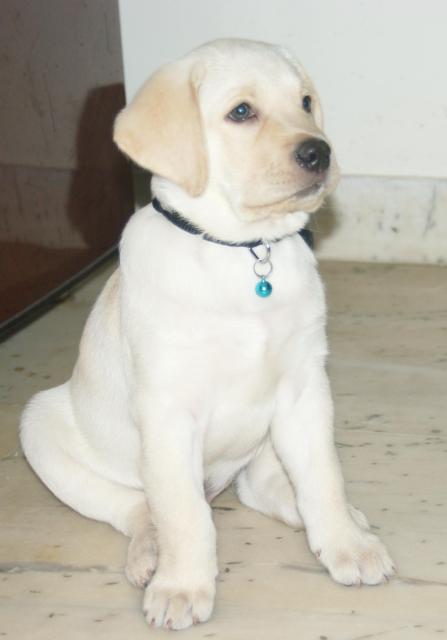 Need opinion about my Labrador Retriever
QuestionCoco (Labrador Retriev
QUESTION: I have
Need opinion about my Labrador Retriever
QuestionCoco (Labrador Retriev
QUESTION: I have